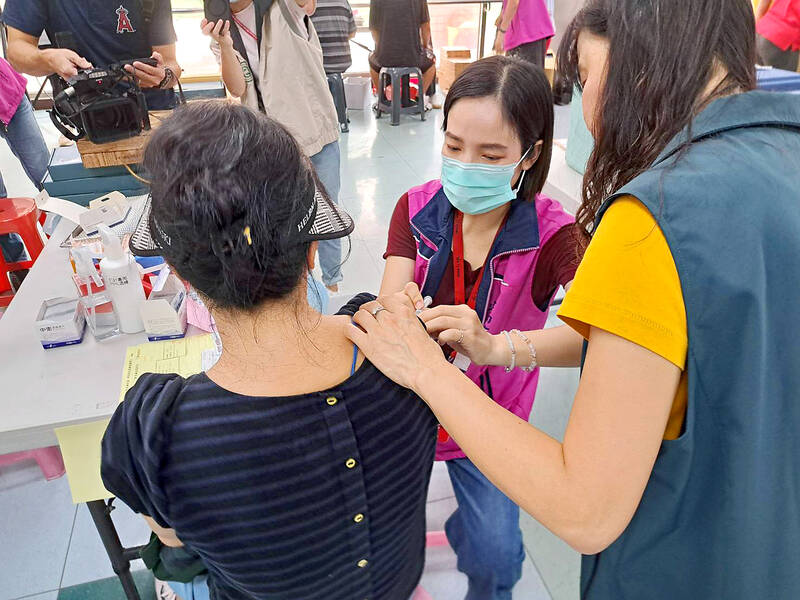Drastic temperature swings in late autumn combined with increased travel have created a breeding ground for viruses, particularly influenza, as clinics across Taiwan reported a sharp increase in visits following the holidays, a doctor said on Sunday.
The late autumn to early winter travel season serves as a prelude to peak flu transmission, thoracic and critical care medicine specialist Ooi Hean (黃軒) wrote on social media, urging people to watch for symptoms such as fever, pain and extreme fatigue.
Many people mistake initial flu symptoms for a common cold triggered by cooler weather, but within three days, they might develop a high fever, severe body aches and intense sore throats, and test positive for the flu, he said.

Photo: Tsai Wen-chu, Taipei Times
The significant temperature differences, from warm during the day to cold at night, in late fall dry out respiratory mucosa, making it more susceptible to viruses, Ooi said.
Furthermore, people on holiday trips carried viruses across the country, he added.
The flu peak in temperate northern hemisphere areas mostly spans from October to April, he said.
Influenza A (H3N2) is expected to be the dominant strain this year, Ooi said, adding that last year’s flu vaccine might not protect against this season’s strains.
The WHO updates the vaccine strain annually based on viral mutations, with the H3N2 subtype showing a notable change this year, he said.
Meanwhile, H1N1 and Victoria, a lineage of type B, strains remain largely unchanged, he said.
Staying up late, irregular sleep schedules and indulging in fried foods can weaken the immune system, Ooi said.
Poor sleep quality or insufficient sleep significantly increases the risk of flu and upper respiratory infections, the doctor said, citing research results, one of which involved hundreds of thousands of participants showing that people with insomnia face a fourfold higher risk of contracting the flu.
Influenza is not just a “cold,” he said, urging people to watch for signs, including a fever above 38°C with chills, muscle and joint aches, severe headache and sore throat, extreme fatigue, and shortness of breath, especially for people with chronic illnesses and elderly people.
Those with these symptoms should seek medical attention, as antiviral drugs, such as oseltamivir, can effectively shorten the illness duration and lower the risk of severe complications if administered within 48 hours of the onset of symptoms, he said.
To boost immunity and protect against viruses, people should prioritize sleep, aiming for seven hours nightly; wear masks in public, and thoroughly wash their hands and face once home; stay hydrated with warm water to maintain mucosal barriers; and limit consumption of fried foods, while eating vegetables, fruit and high-quality proteins such as fish, tofu and eggs, Ooi said.
Members of high-risk groups, such as pregnant women, elderly people and those with chronic conditions, should get vaccinated early to reduce the risk of severe illness and complications, he said.

TRAFFIC SAFETY RULES: A positive result in a drug test would result in a two-year license suspension for the driver and vehicle, and a fine of up to NT$180,000 The Ministry of Transportation and Communications is to authorize police to conduct roadside saliva tests by the end of the year to deter people from driving while under the influence of narcotics, it said yesterday. The ministry last month unveiled a draft of amended regulations governing traffic safety rules and penalties, which included provisions empowering police to conduct mandatory saliva tests on drivers. While currently rules authorize police to use oral fluid testing kits for signs of drug use, they do not establish penalties for noncompliance or operating procedures for officers to follow, the ministry said. The proposed changes to the regulations require

The Executive Yuan yesterday announced that registration for a one-time universal NT$10,000 cash handout to help people in Taiwan survive US tariffs and inflation would start on Nov. 5, with payouts available as early as Nov. 12. Who is eligible for the handout? Registered Taiwanese nationals are eligible, including those born in Taiwan before April 30 next year with a birth certificate. Non-registered nationals with residence permits, foreign permanent residents and foreign spouses of Taiwanese citizens with residence permits also qualify for the handouts. For people who meet the eligibility requirements, but passed away between yesterday and April 30 next year, surviving family members

The German city of Hamburg on Oct. 14 named a bridge “Kaohsiung-Brucke” after the Taiwanese city of Kaohsiung. The footbridge, formerly known as F566, is to the east of the Speicherstadt, the world’s largest warehouse district, and connects the Dar-es-Salaam-Platz to the Brooktorpromenade near the Port of Hamburg on the Elbe River. Timo Fischer, a Free Democratic Party member of the Hamburg-Mitte District Assembly, in May last year proposed the name change with support from members of the Social Democratic Party and the Christian Democratic Union. Kaohsiung and Hamburg in 1999 inked a sister city agreement, but despite more than a quarter-century of

China Airlines Ltd (CAL) yesterday morning joined SkyTeam’s Aviation Challenge for the fourth time, operating a demonstration flight for “net zero carbon emissions” from Taiwan Taoyuan International Airport to Bangkok. The flight used sustainable aviation fuel (SAF) at a ratio of up to 40 percent, the highest proportion CAL has achieved to date, the nation’s largest carrier said. Since April, SAF has become available to Taiwanese international carriers at Taipei International Airport (Songshan airport), Kaohsiung International Airport and Taoyuan airport. In previous challenges, CAL operated “net zero carbon emission flights” to Singapore and Japan. At a ceremony at Taoyuan airport, China Airlines chief sustainability